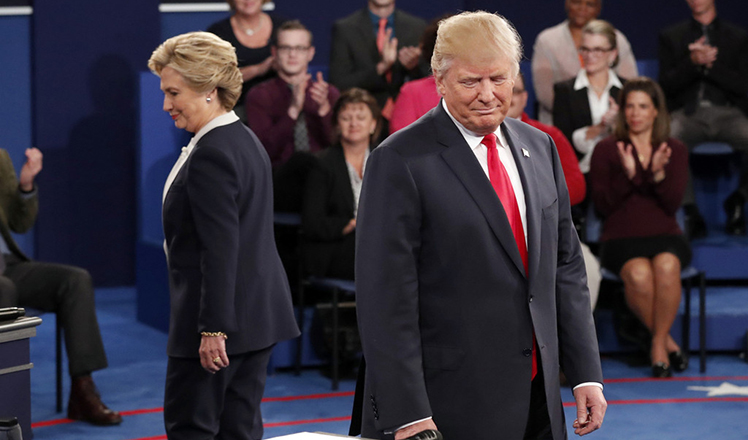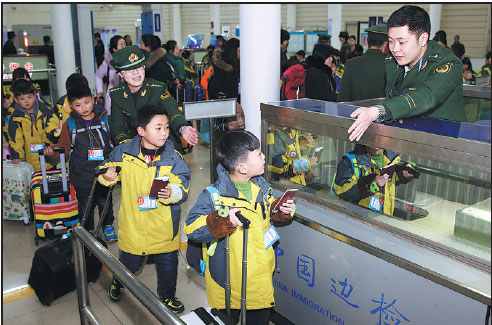Overseas, but underwhelmed
Updated: 2016-10-11 07:52
By Cao Yin(China Daily)
|
||||||||
The rise in the number of children participating in study tours abroad is leading to conflicts between parents and organizers. Cao Yin reports.
Parents are being urged to ensure that they sign contracts and take time to study all the relevant information before allowing their children to take study tours overseas.
The warnings come after a number of schools and education institutions were sued by parents dissatisfied with the services provided, the subjects taught and the food and accommodations on offer.
China's economic development has resulted in rising living standards and incomes, leading a growing number of Chinese to head overseas to study.
Last year, 523,700 Chinese citizens studied at undergraduate level overseas, compared with 339,700 in 2011, according to statistics provided by the Ministry of Education. Meanwhile, a wide range of programs, such as summer camps and non-degree study trips, are becoming increasingly popular.
For most students, the trips offer an opportunity to study in a new environment and develop social skills. Most pass off without incident, but some parents have sued organizers for not providing the services promised, or because food and accommodations failed to meet specified standards.
A family from Beijing recently sued a private middle school after their 13-year-old son returned early from a 10-month study tour to the United States.
"We hoped a trip to the US would help broaden his horizons and experience, so we allowed him to participate in a study tour organized by the school. But when he told us about the food and lodgings in the US, we weren't satisfied," said the family, who preferred not to name the boy or the school.
"We paid 330,000 yuan ($49,500), but we never thought the daily food allowance would be just $3.33 and he would have to share a room with 10 other students. We couldn't accept that, so we allowed him to come home early, and then sued the school."
However, the dispute wasn't resolved as easily as the family had hoped. "They didn't sign a formal contract with the school. In other words, they had no evidence to prove the organizers didn't deliver what they had promised," said Yang Lu, the judge who heard the case at Beijing No 3 Intermediate People's Court.
"The number of similar disputes between families and study tour organizers, including schools, is rising," she said, adding that four cases have been lodged with her court alone since the summer vacation.
On July 15, Yang ordered the school to return 240,000 yuan of the tour fee.
"The parents were unhappy with the verdict - they thought all their money should have been refunded - but it was actually a good result because both parties were at fault," she said.
The court rejected the school's claim that it had provided basic information and contracts before the tour began. "The documents were far from official and were unacceptable as evidence in court," Yang said.
The school also said parents had been informed that living costs were not high as had been expected, and the boy had left because he was unable to adapt to life in the US, she added.
However, the parents were also culpable, because they failed to read the information provided before the visit, "let alone do some homework, such as learning about the regulations that protect children."
Lack of regulation
According to a report published in April by the education service provider New Oriental Education & Technology Group, primary and middle school students account for most of the children on overseas study tours, which are mainly organized by schools and institutions.
It noted that in the future a growing number of parents would prefer their children to participate in study programs organized by schools, rather than other institutions.
"China has no specific laws to govern these study programs, especially long-term, non-degree tours," Yang said.
Hu Guang, a judge at Beijing Haidian District People's Court, said the government should supervise the study tour market, and called on parents to improve their legal awareness before allowing their children to study overseas.
'Disorderly' rise
Overseas study at undergraduate level is well protected under Chinese law, while international exchanges undertaken by universities in China and abroad are governed by strict rules devised by the education ministry.
"In other words, the rise in study visits, those organized by schools for students, most of them younger than 15, has been disorderly," said Yang, who has called for the market to be regulated as quickly as possible.
She is also concerned about the legality of such tours: "I'm not sure whether schools - as part of the country's public educational system - have the right to undertake commercial activities and sign contracts with parents."
Despite the recent problems, Judge Hu believes study visits should be encouraged: "Going out, seeing the world and experiencing different cultures is good for students. What we should do is ensure children's safety overseas," he said.
"It's essential to sign a contract with the organizers, and parents should pay close attention to safety clauses, such as those related to medical care and sanitation."
Hu said parents should improve their risk awareness and attempt to learn basic contract law to clarify each party's responsibilities, especially as schools are often the main organizers, but travel agencies or educational institutions run the actual tours. "That often means their duties are different," he said, referring to differing areas of responsibility, such as which party should pay compensation if things fail to go as planned.
Details equal safety
Both Yang and Hu called on parents to read all the relevant information carefully before allowing their children to participate in trips organized by institutions.
"The more specifics an educational institution provides, the safer the children will be," Yang said. "Because school-based study tours are unregulated, parents are advised to select large, qualified educational institutions with good reputations."
Kou Fei, who oversees foreign study tours at the Education International Cooperation Group, said the company insists that parents sign a contract before their child can participate. "It's a must for us. We provide specific information, such as what the students will eat and where they will live, in the document. Parents are shown photos and videos of the food, lodgings, transportation and what the children will study," she said.
If tours have been organized by a school, the group outlines its responsibilities and those of the school. "We separate our responsibilities from those of the school, and inform parents which party to contact if problems occur," she added.
"The clearer the separation of responsibility, the easier it is to resolve disputes."
Contact the writer at caoyin@chinadaily.com.cn
|
A tour group of primary students pass a border port in Rizhao, Shandong province, before they head for a study tour in South Korea during the winter vacation in January.Provided To China Daily |

 World's top 10 most valuable unicorn companies
World's top 10 most valuable unicorn companies
 Carver finds fame, money in wood sculptures
Carver finds fame, money in wood sculptures
 Missile destroyer to become local military-themed park
Missile destroyer to become local military-themed park
 The world in photos: Sept 26 - Oct 9
The world in photos: Sept 26 - Oct 9
 Classic cars glitter at Berlin motor show
Classic cars glitter at Berlin motor show
 Autumn colors in China
Autumn colors in China
 US second presidential debate begins
US second presidential debate begins
 Egrets Seen in East China's Jiangsu
Egrets Seen in East China's Jiangsu
Most Viewed
Editor's Picks

|

|

|

|

|

|
Today's Top News
Trump outlines anti-terror plan, proposing extreme vetting for immigrants
Phelps puts spotlight on cupping
US launches airstrikes against IS targets in Libya's Sirte
Ministry slams US-Korean THAAD deployment
Two police officers shot at protest in Dallas
Abe's blame game reveals his policies failing to get results
Ending wildlife trafficking must be policy priority in Asia
Effects of supply-side reform take time to be seen
US Weekly

|

|









